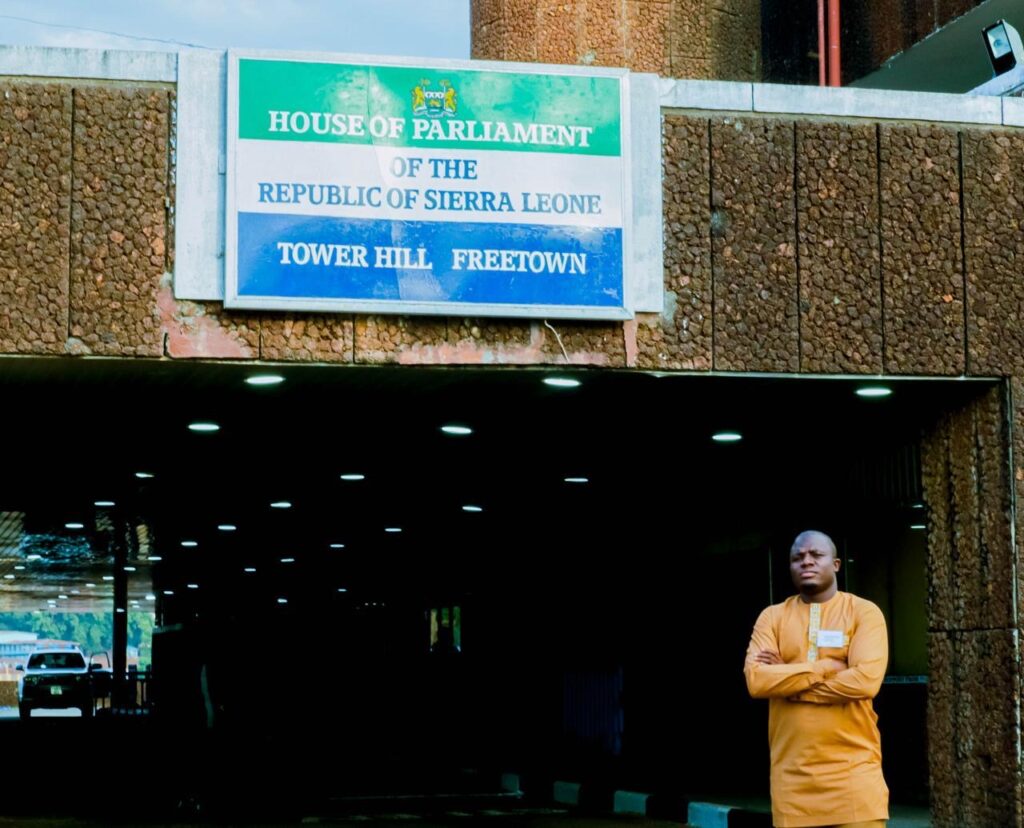By: Duku Jallah, Youth Advocate and Policy Analyst
In Liberia and Sierra Leone, young people fill classrooms, power the informal economy, and drive political conversations online and in the streets. We are the lifeblood of our nations, present in every sector of society except one: power.
In the corridors of Parliament and around cabinet tables, youth voices are rare. Their absence is not accidental, it is structural. Age limits, political gatekeeping, and party hierarchies systematically block young people from leading. While we are expected to campaign, organize, and vote, we are often denied the opportunity to stand, represent, and govern.
In Liberia, the law sets the bar for political leadership high, not in terms of merit or experience, but age. To run for the House of Representatives, you must be 25. For the Senate, 30. For the presidency, 35. These thresholds, written into our constitution, are based on assumptions that maturity comes with age, and that leadership is a domain reserved for the elder class.
By contrast, Sierra Leone permits citizens to run for Parliament at 21. On paper, it’s a more progressive approach, and our recent parliamentary study visit to Sierra Leone, supported by the Netherlands Institute for Multiparty Democracy, gave us the opportunity to examine what this actually means in practice.
There, we sat in the chamber and watched a session in full swing. We met with the Speaker and parliamentary leadership, exchanged ideas with their communications team on building more transparent legislatures, and held honest conversations with civil society groups and the Open Government Partnership.
One thing was immediately clear: lowering the age barrier opens doors. Nearly 20% of Sierra Leone’s MPs are under 35. The average age of lawmakers is around 47 — significantly lower than Liberia’s — and this makes a difference. There’s an energy in their Parliament, a sense that youth are not merely lobbying from the outside, but actively shaping national policy from within.
And yet, legal access alone isn’t enough. Despite a younger Parliament, Sierra Leone lacks a formal youth legislative caucus, a structured space where young MPs can coordinate agendas, push for youth-centered policy, and support one another. That’s one lesson we brought home: inclusion must be both legal and institutional.
Liberia, for all its age restrictions, has the Youth Legislative Caucus, a platform for young lawmakers to unify their voice. But it’s still new, under-resourced, and fighting an uphill battle against systemic resistance. In both countries, political parties continue to serve as gatekeepers, prioritizing loyalty and wealth over vision and integrity. The cost of nomination fees alone is enough to discourage many qualified young leaders from contesting.
And when youth do make it past these barriers, they’re often marginalized, appointed to junior roles, used as political mascots, or co-opted into silence.
What we saw in Sierra Leone inspired us to think bigger about what’s possible in Liberia. That’s why we’re calling for bold, youth-centered reform, not just to laws, but to political culture.
We need constitutional changes that lower the age thresholds for all offices, from Parliament to the presidency. But more than that, we need an act to establish a youth quota, a legal guarantee of youth representation in the Legislature. This isn’t about favor, it’s about fairness. It’s about acknowledging that young people, who make up the majority of Liberia’s population, deserve more than symbolic participation.
We also propose a national mentorship program that connects seasoned policymakers with aspiring youth leaders. Through structured mentorship, young people can gain the tools, confidence, and exposure needed to lead effectively when their time comes.
Another Sierra Leonean lesson worth adopting is the use of the TRC report as a living governance document. While Liberia’s own TRC findings remain buried, Sierra Leone continues to draw on theirs to shape policies and legislative priorities. If we’re serious about post-war transformation, we need to do the same.
Liberia is at a turning point. The youth have kept the peace, fueled the economy, and driven every election cycle. Yet, we remain on the sidelines of actual power. This exclusion isn’t just unfair, it’s dangerous. When the majority of citizens feel unrepresented, democracy falters.
We are not asking to skip the line. We are demanding that the line be open to us, that the ballot paper reflects the society it claims to represent.
The future belongs to us. And we are no longer waiting to be invited in.
We are unlocking the door, ballot by ballot, seat by seat, law by law.
About the Author
Duku Jallah is a Youth Advocate and Head of Secretariat of the Youth Legislative Caucus of the Republic of Liberia. He works at the intersection of governance, policy reform, and youth empowerment.

